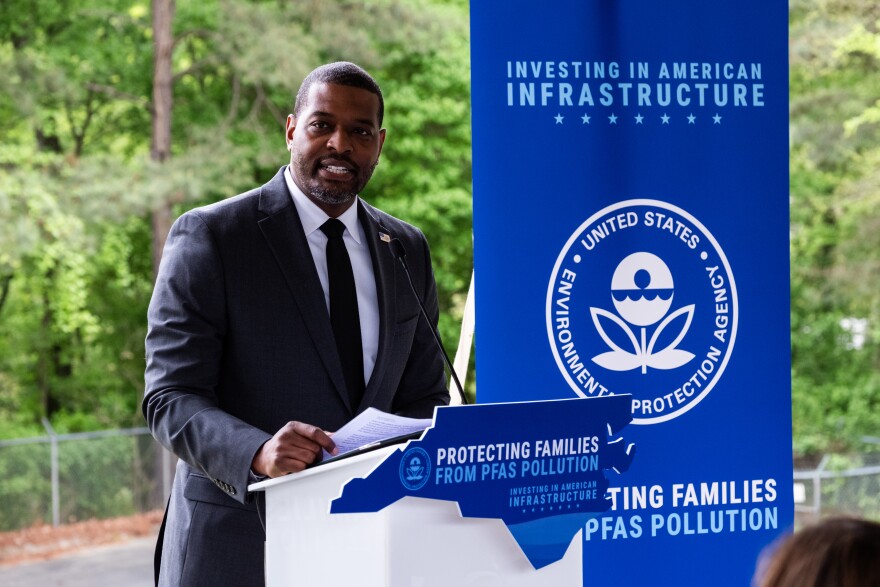At his Fayetteville home, William Lilly explains that he only drinks bottled water because he’s worried about potential health impacts from the tap water. He describes the water as "disgusting."
"It makes me... feel terrible [and] depressed, especially when you start thinking about cancer and stuff like that," Lilly said, shaking his head. "It’s really just sad. I think something [needs] to be done about it."
Lilly gets his water from the Fayetteville Public Works Commission (PWC), and consequently the Cape Fear River, which contains PFAS after chemical companies Chemours and DuPont polluted it for decades.
Just a few blocks away from Lilly’s house is the Hoffer Water Treatment Facility run by PWC.

At this facility on Wednesday, the Environmental Protection Agency (EPA) announced new drinking water standards for six types of PFAS. Several other federal, state and local officials joined the announcement, including North Carolina Attorney General Josh Stein — the Democratic nominee in the North Carolina governor's race this year — Fayetteville Mayor Mitch Colvin, and North Carolina Governor Roy Cooper.
"These new standards will help give people the confidence they deserve when they turn on the tap — that their water is safe and clean," said Cooper.
PFAS are toxic, man-made chemicals used in products like non-stick cookware, waterproof clothing and firefighting foam. PFAS are often called forever chemicals because of how long they take to break down naturally.
"I'm proud to return to North Carolina to announce the first ever nationwide legally enforceable drinking water standard for PFAS," said EPA Administrator Michael Regan. "[This is] the most significant action EPA has ever taken on PFAS. This new standard will reduce PFAS exposure for approximately 100 million people."
While there are thousands of different kinds of PFAS, the new rules establish legally enforceable levels for six of them, including PFOA, PFOS and GenX. These three chemical compounds are highly prevalent in North Carolina waterways.
Acceptable levels range from 4 to 10 parts per trillion (PPT). For PFOA and PFOS, 4 PPT is the lowest level that tests can reliably detect.
According to the North Carolina Department of Environmental Quality (DEQ), over 300 water systems in the state have PFAS levels that exceed these new standards.
"That includes 42 municipal water systems serving nearly 3 million residents combined, as well as approximately 20% of small public water systems tested," DEQ said in a press release.
Public water systems across the country now have three years to determine PFAS levels in their water, and then another two years to reduce levels depending on what testing shows. So, by 2029, public water systems must meet these legally enforceable levels.

"With these six [PFAS], we have the best science and data to design these health standards," Regan said. "This is the first of six and we're going to continue until we get to all of them.
Alongside these new standards, Regan announced $1 billion in federal funding "for states and territories to conduct initial testing and treatment at public water systems and homes served by privately owned wells."
Funds come from the Bipartisan Infrastructure Law. Regan said money will be distributed based on need and prioritize communities that have been disproportionately impacted.
Water utilities are taking issue with the new standards, as treatment systems are expensive to install. The EPA estimates the rule will cost about $1.5 billion to implement each year.
Utility groups warn customers could end up paying more for water, and small communities with fewer resources could be most impacted. Legal challenges are sure to follow.
However, clean water activists are applauding these new standards. Emily Donovan is the co-founder of Clean Cape Fear, a grassroots organization based in Wilmington.
"It is amazing and exhilarating. It’s also bittersweet," Donovan said. "We know that in order to get here it took some hard storytelling. We’ve had a lot of... people who shared their stories who are no longer with us in this fight, and so we honor them today."
While Donovan and other advocates agree this is a great step forward, they also want to stop PFAS pollution at the source.
"At the same time that there are drinking water standards, there also needs to be control of that upstream industrial PFAS pollution. And the way to do that is by putting in permit limits for PFAS," said Jean Zhuang, senior attorney at the Southern Environmental Law Center.
DEQ says its proposing state groundwater and surface water standards to complement the federal guidelines. The agency says it will keep working with public water systems to provide technical assistance and funding opportunities to reduce PFAS and install treatment.
The Associated Press contributed to this report.







